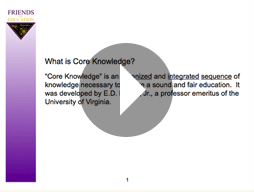Core Knowledge
The Core Knowledge sequence is premised on the proven method that education is more effective when students learn a specified body of common content in a coordinated, grade-by-grade sequence that permits them to build on prior knowledge without repetition or gaps. The Core Knowledge sequence promotes equality by not assuming that students will learn needed information from sources outside school.
In each grade, students are exposed to a broad range of historical, scientific, and cultural topics that build on one another to prepare for later educational success. This wide range of subject matter not only develops cultural literacy but also builds the strong vocabulary necessary for reading comprehension.
Instructors teach the subject matter in the manner most effective for them, but the content is specified and builds from year to year. Following are examples of specific content requirements for each grade (this is not an all-inclusive list):
|
| Math | Science | History |
| K |
|
|
|
| 1 |
|
|
|
| 2 |
|
|
|
| 3 |
|
|
|
| 4 |
|
|
|
| 5 |
|
|
|
Language Arts: Language Arts emphasizes phonemic awareness and decoding so that mastery of these skills is achieved by grade 3. All grades emphasize vocabulary building and comprehension, primarily through literature such as:
| |||
For more information about Core Knowledge, visit www.coreknowledge.org

